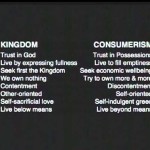We run our website the way we wished the whole internet worked: we provide high quality original content with no ads. We are funded solely by your direct support. Please consider supporting this project.

McChurch
In the West, we tend to think of church as a weekend gathering in a special religious building. As a result, many mistakenly assume that Paul wrote his letters to a single body of people in a specific town who gathered together as a rather large group once a week. In reality, the regional churches Paul wrote to consisted of a number of smaller groups who usually met in each other’s homes. We know from archeology that homes of this period rarely could accommodate more than a couple dozen people, which means that the house churches early Christians gathered in had to remain quite small.
This isn’t to say early Christians saw anything wrong with large group gatherings, such as the kind Jesus attracted. When possible, Christians throughout a region gathered together for fellowship and worship (Ac 1:13-15, 2:46, 5:12). Yet, the primary unit of the early Kingdom revolution were small house churches. This was a place where folks were in intimate relationships with fellow Christians, and they were discipled in the Kingdom way. You would have attended one of these house churches because that’s where you lived, and if conflict or disagreements arose, you would have had to work through that conflict because there was really no other choice.
Today, the experience of church is quite different for most Christians. Once a week we go to church at a religious building to consume a religious product instead of actively participating. We don’t necessarily know anyone in a deep way. As good consumers, we typically choose our church based on individual preferences, convenience, and felt-needs. If a church fails to please us or if conflict arises, we simply shop for another church. And since there are only so many religious consumers to go around, churches feel the need to compete with each other to acquire and keep as many of those consumers as possible.
We might call this McChurch, a place where you get served up a Gospel suited to your personal tastes and preferences. Anything that might be challenging or cause discomfort tends to be placed on the back burner or ignored altogether to avoid upsetting and possibly losing the consumer. This stands in sharp contrast to what it meant to be a part of a church in the New Testament.
With a McChurch mentality, those leading the church might fail to confront the idols and pagan values of Western culture, and those who attend expect that those idols and pagan values will be left alone. In fact, people don’t even recognize that those values are pagan in nature because the church actually “Christianizes” them. The things that Jesus challenged, the church often promotes. I’ll give you a couple examples.
- When was the last time you heard a sermon confronting greed as Jesus did? (Matt. 6:19-21) This is routinely glossed over in today’s churches. Instead we are often told that following Jesus will result in prosperity, and that blessings can be measured by the number and quality of your possessions.
- Think about how little we hear the teaching that God calls us to love and serve our enemies (Matt. 5:43-48). Such messages might make us uncomfortable. Instead, we hear that God is on the side of our nation and we applaud the bombing of our enemies.
In the New Testament, the church is often referred to as the “body of Christ.” Jesus acquired an ordinary body when he was born in Bethlehem, and now he has acquired a collective body called the church. We are his hands, mouth, and feet operating in the world today. The same life that was in Christ, his first body, is in us, his corporate body. This means we take our marching orders from “the head of the church,” rather than developing strategies that will keep spiritual consumers happy and satisfied.
Photo credit: Bart Heird via VisualHunt / CC BY-NC-ND
Category: General
Tags: Church, Consumerism, Discipleship
Topics: The Church
Related Reading

Cross-like Love and Non-Violence
Cosmo Spacely via Compfight Though it seems to have been forgotten by many today, the cross wasn’t simply something God did for us. According to the NT, it was also an example God calls us to follow. Hence, after John defined love by pointing us to Jesus’ death on the cross on our behalf, he…

How We Are Defined
Burstein! via Compfight Zack Hunt wrote a piece called Abortion, Gay Marriage, Immigration, Gun Control, and the Church over at A Deeper Story. He points out that we have a big problem on our hands when it comes to the ways we have come to be defined by these issues. Christians are primarily defined in…

The “Christus Victor” View of the Atonement
God accomplished many things by having his Son become incarnate and die on Calvary. Through Christ God revealed the definitive truth about himself (Rom 5:8, cf. Jn 14:7-10); reconciled all things, including humans, to himself (2 Cor 5:18-19; Col 1:20-22), forgave us our sins (Ac 13:38; Eph 1:7); healed us from our sin-diseased nature (1…

Lab Rats No More
Is this threat to Christianity something we are completely ok with? In this sermon clip, Greg Boyd asks that very question. In American culture, we are constantly being told to buy products and be discontent with our current situation. Like lab rats, we are constantly stimulated and tested to change our situation. Greg speaks to…

The Religionless Church of the Future
“The time when men could be told everything by means of words, whether theological or simply pious, is over, and so is the time of…religion as such.… [W]hat is religionless Christianity?… What is the significance of a Church… in a religionless world?” Deitrich Bonhoeffer, Letter From Prison, April 30th, 1944. The Crisis of a…

Consumer Wars: Sermon Clip
To go along with our other post today, here’s a clip from Greg’s sermon last week. If you don’t have any financial margin in your life, this might have something to do with it. You can find the entire sermon here.
